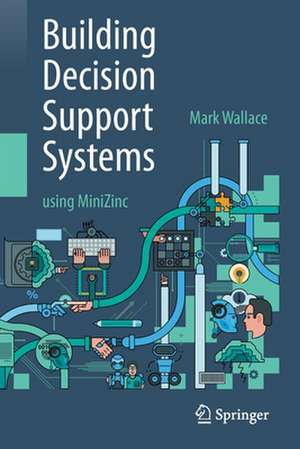Building Decision Support Systems: using MiniZinc
Autor Mark Wallaceen Limba Engleză Paperback – 24 apr 2020
This book introduces readers to the principles of intelligent decision support systems (IDSS) and how to build them with MiniZinc, a free, open-source constraint programming language. Managing an IDSS project requires an understanding of the system’s design and behaviour. The book enables readers to appreciate what “combinatorial” optimisation problems are, and how modelling a problem provides the basis for solving it. It also presents the main algorithms for tackling decision support problems, discusses their strengths and weaknesses, and explores ways of achieving the necessary scalability when problems become big. Moreover, to support the learning process it allows readers to try out the ideas described in the text on model applications and puzzles.
The book highlights the potential benefits of deploying an IDSS. It enables users to recognise the key risks involved and identify which techniques can be applied to minimise them, and to understand the decision support technology sufficiently in order to manage or monitor an IDSS project. It also helps readers distinguish between good sense and mere jargon when dealing with anyone involved in an IDSS project, from sales personnel to software implementers. As such it especially appeals to graduate students and advanced professionals who need to learn how to build an IDSS and to tackle the problems on the way.
The book highlights the potential benefits of deploying an IDSS. It enables users to recognise the key risks involved and identify which techniques can be applied to minimise them, and to understand the decision support technology sufficiently in order to manage or monitor an IDSS project. It also helps readers distinguish between good sense and mere jargon when dealing with anyone involved in an IDSS project, from sales personnel to software implementers. As such it especially appeals to graduate students and advanced professionals who need to learn how to build an IDSS and to tackle the problems on the way.
Preț: 383.85 lei
Preț vechi: 479.81 lei
-20% Nou
Puncte Express: 576
Preț estimativ în valută:
73.51€ • 75.01$ • 61.85£
73.51€ • 75.01$ • 61.85£
Carte tipărită la comandă
Livrare economică 26 februarie-12 martie
Preluare comenzi: 021 569.72.76
Specificații
ISBN-13: 9783030417314
ISBN-10: 303041731X
Pagini: 224
Ilustrații: XVI, 224 p. 65 illus., 19 illus. in color.
Dimensiuni: 155 x 235 mm
Greutate: 0.35 kg
Ediția:1st ed. 2020
Editura: Springer International Publishing
Colecția Springer
Locul publicării:Cham, Switzerland
ISBN-10: 303041731X
Pagini: 224
Ilustrații: XVI, 224 p. 65 illus., 19 illus. in color.
Dimensiuni: 155 x 235 mm
Greutate: 0.35 kg
Ediția:1st ed. 2020
Editura: Springer International Publishing
Colecția Springer
Locul publicării:Cham, Switzerland
Cuprins
Motivation for IDS.- Modelling and Choices.- Examples of Industrial Decisions.- Problem Modelling in MiniZinc.- Algorithms and Complexity.- Constraint Classes.- Constraint Classes and Solvers.- Constraint Classes in MiniZinc.- Integrating Solvers with Search.- Search Control in MiniZinc.- Uncertainty.- IDSS for optimisation - the future.
Recenzii
“Decision support systems using MiniZinc is ideal for a wide spectrum of readers, from novice to expert users of MiniZinc and/or constraint/optimization programming. … This book was written so clearly and thoughtfully that I walked away feeling like I had a solid foundation for the topic. … newcomers to one or both will find the plentiful examples, thoughtful exercises, and relaxed writing style the best way to learn these concepts and software.” (Christopher Battiston, Computing Reviews, July 21, 2021)
Notă biografică
Mark Wallace is a leader in discrete optimisation at the Faculty of Information Technology at Monash University, Australia. He spent 21 years at the UK computer manufacturer ICL, moving from global marketing, to development, and finally to research. At Imperial College London he led the Constraint Programming team, whose software was purchased by Cisco Systems. In Australia, he founded the company Opturion, to productise and deploy a constraint modelling system now used in Australia’s leading logistics companies. His research tackles the integration of multiple optimisation techniques and algorithms and their application to solving complex resource planning and scheduling problems.
Textul de pe ultima copertă
This book introduces readers to the principles of intelligent decision support systems (IDSS) and how to build them with MiniZinc, a free, open-source constraint programming language. Managing an IDSS project requires an understanding of the system’s design and behaviour. The book enables readers to appreciate what “combinatorial” optimisation problems are, and how modelling a problem provides the basis for solving it. It also presents the main algorithms for tackling decision support problems, discusses their strengths and weaknesses, and explores ways of achieving the necessary scalability when problems become big. Moreover, to support the learning process it allows readers to try out the ideas described in the text on model applications and puzzles.
The book highlights the potential benefits of deploying an IDSS. It enables users to recognise the key risks involved and identify which techniques can be applied to minimise them, and to understand the decision support technology sufficiently in order to manage or monitor an IDSS project. It also helps readers distinguish between good sense and mere jargon when dealing with anyone involved in an IDSS project, from sales personnel to software implementers. As such it especially appeals to graduate students and advanced professionals who need to learn how to build an IDSS and to tackle the problems on the way.
Caracteristici
Introduces the principles of intelligent decision support systems Explains the techniques for building intelligent decision support systems as well as the risks involved and how to tackle them Provides numerous helpful tips on practical problems like the strengths and weaknesses of various approaches, and their scalability Complemented by plentiful examples using MiniZinc, a free, open-source constraint programming language
